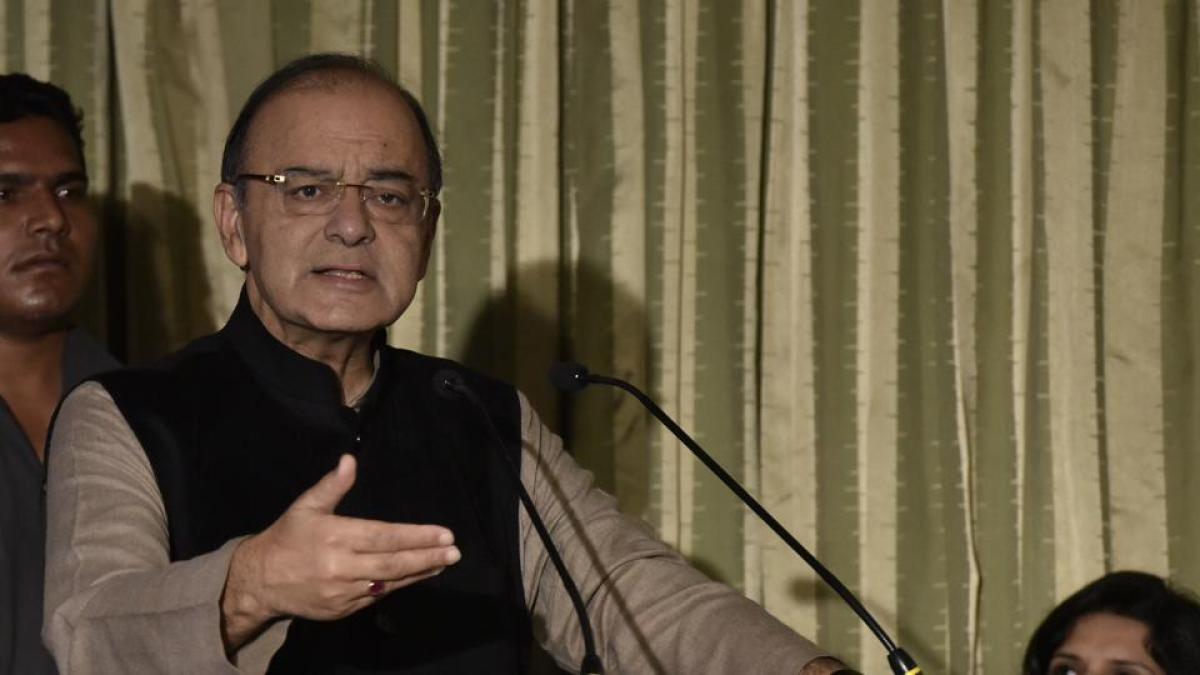Live
- First Impressions and Unboxing of the MacBook Pro M4: A Powerhouse for Professionals and Creators
- China Gears Up for Potential Trade War Amid Trump’s Tariff Threats
- Small Farmers Gain Less by Selling to Supermarkets: Study Reveals
- Why Despite the Controversy, America Is Anticipating the Mike Tyson vs. Jake Paul Fight
- Sanju Samson and Tilak Varma Shine: Record-Breaking Feats in 4th T20I Against South Africa
- India Urges $1.3 Trillion Annual Climate Support for Developing Nations
- Bad air: 106 shuttle buses, 60 extra Metro trips planned to make Delhiites give up cars
- WHO reports declining monkeypox cases in Congo
- CM Attends Kotideepotsavam on Kartika Purnima
- PKL Season 11: Raiding trio of Devank, Ayan, Sandeep help Patna Pirates rout Bengal Warriorz
Just In

After tightening rules for depositing old Rs 500 and Rs 1,000 notes, Finance Minister Arun Jaitley on Monday night said no questions will be asked if any amount of the junked currency is deposited in one go but repeated deposits may raise queries.
New Delhi: After tightening rules for depositing old Rs 500 and Rs 1,000 notes, Finance Minister Arun Jaitley on Monday night said no questions will be asked if any amount of the junked currency is deposited in one go but repeated deposits may raise queries.
With nearly Rs 13 lakh crore out of the Rs 15.4 lakh crore worth of Rs 500 and Rs 1,000 junked already deposited in banks, the government has changed rules to mandate that individuals can deposit over Rs 5,000 in old currency bills only once until December 30 and that too after explaining why it had not been done so far.
Explaining the rationale behind the move, the finance minister said all exemptions to certain sectors and utilities, which had been allowed to accept the banned currency post-demonetisation, ended last week and all those in possession of the old notes are supposed to deposit them with banks.
"Anyone who has old currency notes is not allowed to trade in them. He can only go and deposit them with banks," he said. With a view to curtail queues at banks, holders are encouraged to deposit the entire holding in one go, rather than going repeatedly.
"If they go and deposit with bank any amount of currency no questions are going to be asked to them and therefore the 5000 rupee limit does not apply to them if they go and deposit it once."
"But if they are going to go everyday and deposit some currency, same person, that gives rise to suspicion that where is he acquiring this currency from. In that event a person may have something to worry about. Therefore everyone is advised whatever old currency you have please go and deposit it now," Mr Jaitley said.
Since there is no scope now for earning any old currency because all exemptions have been waived, it makes sense to go deposit all the holding in one go, Mr Jaitley further said.
"This is the objective of the order passed today." After banning old Rs. 500 and Rs. 1,000 notes on November 8, the government had allowed all of the cash holdings with any person to be deposited in bank accounts till December 30.
There was no limit on the quantity or value of the junked notes that could be deposited. However, the government on December 17 issued a gazette notification putting restrictions on deposits henceforth.
"The deposits of old notes of Rs. 500 and Rs. 1,000 denominations have been reviewed by the government from time to time. Already more than five weeks have elapsed since the time of the announcement of the cancellation of the legal tender character of these notes. It is expected that, by now, most of the people would have deposited such old notes in their possession," an official statement said.
With a view to "reduce the queues in the banks", the government said it has now been decided that "amounts exceeding Rs. 5,000 in old notes can be deposited only once between now and December 30, 2016".
"The banks have been advised to conduct due diligence regarding the reasons for not depositing these notes earlier," the statement said. Amounts of Rs. 5,000 or less may continue to be deposited with banks in the customer's account, at present.
"However, cumulative deposits exceeding Rs. 5,000 between December 19 and December 30, 2016 will be as per the procedures advised by the RBI in respect of deposits exceeding Rs. 5,000," it said.
The Reserve Bank of India (RBI) too came out with a deposits guideline stipulating that restrictive conditions will also apply on the cumulative deposit of such notes in a single account when it exceeds Rs. 5,000.
However, the defunct currency up to any amount can be deposited under the new black money amnesty scheme, PMGKY.

© 2024 Hyderabad Media House Limited/The Hans India. All rights reserved. Powered by hocalwire.com







